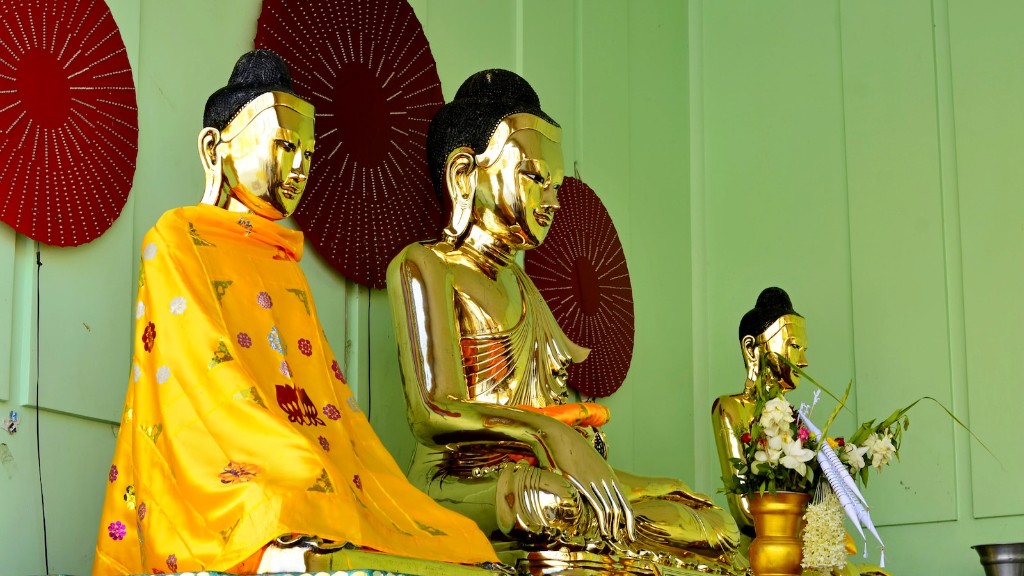Buddhism is a religion that was founded over 2,500 years ago. Though it has undergone many changes over the centuries, it is still practiced by millions of people around the world today. In its simplest form, Buddhism teaches that all beings have the potential to awake from the dream of suffering and confusion that characterizes unenlightened life. Through spiritual practice, we can liberate ourselves from the cycle of rebirth and achieve ultimate happiness.
Yes, Buddhism is still practiced today. There are an estimated 350 million Buddhists worldwide, and Buddhism is recognized as an official religion in countries such as Thailand, Sri Lanka, Myanmar, and Cambodia.
How is Buddhism today?
Buddhism is a religion that is native to the Indian subcontinent and today is found throughout the world, especially in East and Southeast Asia. In India itself, however, Buddhism is now barely widespread. Today, Thailand and the neighboring countries, Myanmar, Laos and Cambodia as well as other Asian countries have the greatest spread of Buddhism.
Buddhism is a religion that is based on the teachings of Siddhartha Gautama. It is believed that Siddhartha Gautama was born in the 5th century BCE in South Asia. After he had attained enlightenment, he began teaching others about his findings. These teachings eventually spread across Asia and the rest of the world.
What are modern Buddhist practices
Buddhist modernism is a movement that began in the late 19th century as a response to the challenges posed by the rapid modernization of society. It is characterized by an emphasis on texts, rationality, meditation, egalitarianism, and increased participation of women and laity, along with a deemphasis on ritual, dogma, clerical hierarchy, “superstition,” traditional cosmology, and icon worship.
Buddhist modernism has had a significant impact on the development of Buddhism in the West, where it has led to the rise of new schools and movements such as the Tibetan Buddhist tradition of the New Kadampa Tradition and the Theravada tradition of Insight Meditation.
There are a number of reasons for the decline of Buddhism in India, but one of the most significant was the growth of new forms of Hinduism. These new Hindu movements were often more appealing to the general population than Buddhism, with their emphasis on caste and social status. This led to a decrease in financial support for Buddhist monasteries from both the laity and royalty, which contributed to the decline of the religion.
Does Buddhism recognize a god?
Buddhism is a religion that does not believe in a supreme god or deity. Instead, followers of Buddhism focus on achieving enlightenment, which is a state of inner peace and wisdom. Once a follower of Buddhism reaches this spiritual echelon, they are said to have experienced nirvana. The founder of Buddhism, Buddha, is considered an extraordinary being, but not a god.
There are inherent and fundamental differences between Buddhism and Christianity. Christianity is at its core monotheistic and relies on a God as a Creator, while Buddhism is generally non-theistic and rejects the notion of a Creator God. Buddhism also does not believe in an afterlife, while Christianity does. These differences impact the values each religion places on the world.
Why do Buddhists not believe in god?
Atheism is not a common belief in Buddhism or Jainism. However, some people in these traditions may disbelieve in a personal god or gods. This lack of belief does not necessarily mean that these individuals are atheists in the philosophical sense, as they may still believe in other supernatural beings or forces.
Buddhism is a religion based on the teachings of Siddhartha Gautama. The main principles of Buddhism are karma, rebirth, and impermanence.
Who is the current Buddha
The Theravada tradition teaches that there can be up to five Buddhas in a kalpa or world age. The current kalpa has had four Buddhas, with the current Buddha, Gotama, being the fourth and the future Buddha Metteyya being the fifth and final Buddha of the kalpa. This tradition emphasizes the importance of the current Buddha and his teachings, as well as the importance of looking forward to the future Buddha and his teachings.
The precepts are a set of guidelines that Buddhists commit to in order to live a moral and meaningful life. They include abstaining from killing living beings, stealing, sexual misconduct, lying, and intoxication. The aim of following the precepts is to develop one’s mind and character so that they can progress on the path to enlightenment.
How to live Buddhist in today’s society?
As a Buddhist, I strive to be mindful of my own thoughts and actions and to see the good in all living beings. I realize that we all make mistakes as a result of our suffering and misperception, and that it is important to be kind to ourselves and others and to forgive both ourselves and others.
Buddhism teaches that we are all interconnected and interdependent. This means that we are all responsible for our own actions and choices. This is in line with the fundamental notions of modern science, which holds that we are all independently acting and responsible agents.
Can you leave the Buddhist religion
Buddhism is seen as a tolerant religion as it does not force anyone to follow its teachings and instead encourages them to question and analyse them. People are free to leave the Buddhist faith if they wish and there is no pressure to stay. This makes Buddhism an attractive religion for many people as it does not try to control them like some other religions do.
The Buddhist population in North America is projected to grow significantly in the next few decades. This growth is due in part to the large number of immigrants from Buddhist-majority countries who are expected to arrive in the region. Additionally, the Buddhist population is naturally increasing as members of the baby boomer generation reach adulthood. By 2050, it is estimated that Buddhists will make up 14% of North America’s total population.
What is the problem with the world in Buddhism?
The Ennobling Eightfold Path is a system of spiritual practices that indicates that what is wrong with us goes beyond having ignorant, dichotomous, self-centered views. This is in line with the tradition of Buddhist philosophy, which says that the root of all suffering is ignorance. The path leads us to renounce our self-centered views and develop wholesome, skilful ways of thinking, speaking and acting.
Despite the great diversity of Buddhist traditions across various countries, Buddhism in general has restricted the consumption of alcohol since early times. This is due to the belief that alcohol consumption can lead to a loss of mindfulness and increase the chances of engaging in harmful actions.
Final Words
Yes, Buddhism is still practiced today. It is estimated that there are between 350 million and 1.2 billion Buddhists in the world, making Buddhism the fourth largest religion. Buddhism is practiced throughout Asia and has a growing presence in the West.
Yes, Buddhism is still practiced today by millions of people around the world. Buddhism teaches that the path to happiness is through living a life of mindfulness, compassion, and altruism. Practicing Buddhism can help people to find inner peace and contentment.



